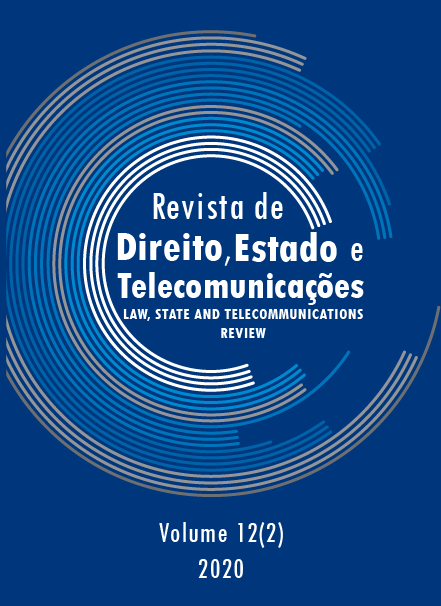GDPR v. GDPL
Strategic Adoption of the responsiveness approach in the elaboration of Brazil´'s General Data Protection Law and the EU General Data Protection Regulation
DOI:
https://doi.org/10.26512/lstr.v12i2.34692Keywords:
Data Protection. Responsive Regulation Theory. Regulatory Authorities. Compliance. Nodal Governance.Abstract
Purpose ”“ The main purpose of this article is to analyze the aspects of the responsiveness approach adopted by European and Brazilian lawmakers in the elaboration of data protection rules, such as GDPR and LGPD.
Methodology ”“ The applied methodology is based on the responsive regulation theory and, additionally, the network governance theory, through the comparative analysis of personal data protection legal frameworks in Brazil and the EU.
Findings ”“ Based on the comparative analysis of the GDPR and the LGPD, it is verified the adoption of escalated regulatory techniques of Ayres and Braithwaite’s enforcement pyramid in the developed of these norms, as a strategy adopted by lawmakers to guarantee a greater compliance from regulated entities.
Downloads
References
ARANHA, M. I. Manual de Direito Regulatório: Fundamentos do Direito Regulatório, 5a ed. rev. ampl, London: Laccademia Publishing, 2019.
ARANHA, M. I. Telecommunication Regulatory Design in Brazil: Networking around State Capacity Deficits. Economia Pubblica, v. 25, n. 2, p. 83-105, 2016.
BENADY, D. GDPR: Europe is taking the lead in data protection. Raconteur, 2018. Disponível em: < https://bit.ly/33rbSBT>. Acesso em: 21/10/2019.
BRAITHWAITE, J. Responsive Regulation and Developing Economies. World Development, v. 34, n. 5, p. 884-898, 2006.
BURRIS, S; DRAHOS, P; SHEARING, C. Nodal Governance. Australian Journal of Legal Philosophy 30, p. 30”“58, 2005.
CAVALCANTI, N; SANTOS, L. Lei Geral de Proteção de Dados do Brasil na Era do Big Data. In: FERNANDES, R; CARVALHO, A. Tecnologia Jurídica & Direito Digital: II Congresso Internacional de Direito, Governo e Tecnologia ”“ 2018, Belo Horizonte: Fórum, 2018. p. 351 -365.
CENTER FOR INFORMATION POLICY LEADERSHIP. Learning from the EU GDPR: What Elements Should the US Adopt? 2019. Disponível: em: <https://bit.ly/3hwehjR>. Acesso em: 1º/12/ 2019.
CENTER FOR INFORMATION POLICY LEADERSHIP. CIPL Accountability Q&A. 03 de julho de 2019. Disponível em: <https://bit.ly/2Rr38Gg>. Acesso em: 1º/12/2019)
CONSUMERS INTERNATIONAL, Coming Together for Change. The State of Data Protection Rules around the World: a briefing for consumer organisations. Disponível em: <https://bit.ly/3bZeOJV>. Acesso em: 02/12/2019.
EURONEWS. France fines Google €50 million using EU's transparency and consent law. Publicado: 21 de janeiro de 2019. Disponível em: <https://bit.ly/2RsocMx >. Acesso em: 1º/12/2019.
HIJMANS, H. How to enforce the GDPR in a strategic, consistent and ethical manner? A reaction to Christopher Hodges. European Data Protection Law Review, v. 4, n. 1, p. 80- 84, 2018.
HODGES, C. Delivering data protection: Trust and Ethical Culture. European Data Protection Law Review, v. 4, n. 1, p. 65- 79, 2018.
KOCH, R. What is the LGPD? Brazil’s version of the GDPR. Disponível em: <https://bit.ly/2RptBUD>. Acesso em: 30/11/2019.
MARTIAL-BRAZ, N. O direito das pessoas interessadas no tratamento de dados pessoais: anotações da situação na França e na Europa. Revista de Direito, Estado e Telecomunicações. v. 10, n. 1, p. 85-108, 2018.
ORGANIZAÇÃO PARA A COOPERAÇÃO E DESENVOLVIMENTO ECONÔMICO. OECD Guidelines on the Protection of Privacy and Transborder Flows of Personal Data, 2013.
ROCHFELD, J. Como qualificar os dados pessoais? Uma perspectiva teórica da União Europeia em face dos gigantes da Internet. Revista de Direito, Estado e Telecomunicações, v. 10, n. 1, p. 61-84, 2018
UNIÃO EUROPEIA. Comissão Europeia. (2019a) Communication from the Commission to the European Parliament and the Council: Data Protection Rules as a trust-enabler in the EU and Beyond ”“ taking stock. Brussels, 24.7.2019 COM(2019) 374 final. Disponível em: <https://bit.ly/2Rwwral>. Acesso em: 04/12/2019.
______. Comissão Europeia. (2019b) EU Data Protection Rules. Disponível em: <https://bit.ly/2RwwSkZ>. Acesso em: 01 de dezembro de 2019)
______. Multistakeholder Expert Group to Support the Application of Regulation (EU) 2016/679. Contribution from the Multistakeholder Expert Group to the Stock Taking Exercise of June 2019 on the Year of GDPR Application. Relatório: 13 de junho de 2019. Disponível em: <https://bit.ly/33rQJaL>. Acesso em: 02/12/2019.
TEFFÉ, C. S. & VIOLA, M. Proposta para Criação da Autoridade Brasileira de Proteção de Dados. Disponível em: <https://bit.ly/2RsRGt>. Acesso em: 30/11/2019.
VALENTE, J. Lei de Proteção de Dados traz desafios a empresas, cidadãos e governo. AGÊNCIA BRASIL: Publicado em 25/08/2019. Disponível em: <https://bit.ly/3khXTFu>. Acesso em 1º/12/2019.
Downloads
Published
How to Cite
Issue
Section
License
Copyright (c) 2020 Law, State and Telecommunications Review

This work is licensed under a Creative Commons Attribution 4.0 International License.
By submitting this paper to the Law, State and Telecommunications Review,
I hereby declare that I agree to the terms of the Creative Commons Attribution 4.0 International (CC BY 4.0).


